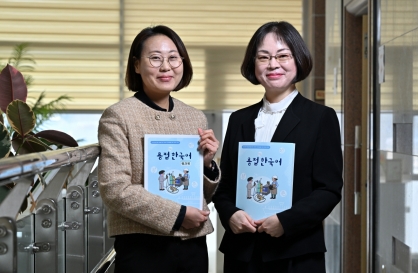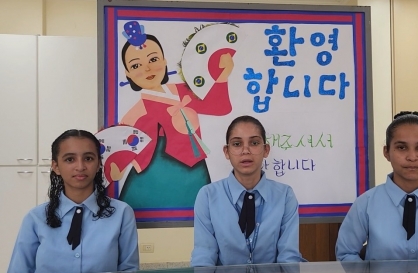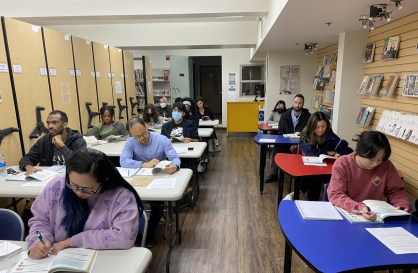Most Popular
Hello Hangeul
-
1
Welding book first in vocational Korean series for foreign labor

-
2
[Korea Beyond Korea] In Sao Paulo, horizons expand for Korean studies
![[Korea Beyond Korea] In Sao Paulo, horizons expand for Korean studies](//res.heraldm.com/phpwas/restmb_idxmake.php?idx=644&simg=/content/image/2023/11/20/20231120000619_0.jpg&u=20231206104853)
-
3
In Brasilia, worldly dreams are born from Korean classes

-
4
Americans seeking to visit Korea learn the language in LA

-
5
[Korea Beyond Korea] Berlin, Europe's Korean Studies hub, nurtures next-gen experts, scholars
![[Korea Beyond Korea] Berlin, Europe's Korean Studies hub, nurtures next-gen experts, scholars](//res.heraldm.com/phpwas/restmb_idxmake.php?idx=644&simg=/content/image/2023/10/18/20231018000929_0.jpg&u=20231023154735)
[Hello Hangeul] Upgrade needed for teaching 'advanced' Korean
Educators struggle with teaching advanced-level courses due to the absence of a proper educational and training system, experts say
By Park Jun-heePublished : March 26, 2023 - 15:56

The soaring popularity of South Korean pop culture has fueled a boom in Korean language learning using songs and dramas in recent years.
With the help of the media and internet, foreign learners are putting their best foot forward to get a better grasp of Korean colloquial expressions, new words and slang used by younger Koreans. Some learners also improve their linguistic knowledge by taking Korean language classes.
Teachers often find introductory Korean courses easier to teach, but they often start to struggle when it comes to teaching difficult nuances to more advanced learners as the classes progress beyond basic vocabulary and elementary reading, speaking and writing skills. This is why linguists in Korea are calling for a proper educational and training system that could help teachers with more high-performing learners.
Yun Suk-jin, a Korean language professor at Chungnam National University, pointed out that teachers of TOPIK -- a six-tier Korean proficiency test for overseas Koreans and foreigners -- are faced with the challenge of teaching levels above the intermediate.
“If levels one to three are about the basic (Korean) language, four to six go beyond that. It’s about telling and conveying the Korean language, linguistics and the nuances of Korean culture and society,” Yun said.
Lower levels are comprised of two sections -- reading and listening, while intermediate and advanced levels include reading, listening and writing sections that require a deeper understanding and discussion of topics in politics and economics. These levels also prompt test-takers to select appropriate expressions and distinguish between formal and informal registers, written and spoken language, and different uses of language according to context, which Yun thinks are the parts that Korean educators often struggle with.
Besides reading and writing fluently, knowing how to speak the language is also a crucial part of assessing a person’s language proficiency, according to Yun, but discussions during classes, for example, can be challenging for non-Koreans who don’t have high language proficiency.
The best option is to train educators about the meaning and history behind the country’s politics, economy, society and culture so that they can better connect with foreign learners, Yun advises.
Yun, however, noted that developing and implementing such programs would likely require a hefty government budget.
“The government should develop a good foundation for teachers since the Korean language has so much more to offer to foreigners apart from its culture. But this means more money,” Yun said. “In the end, it’s a policy failure because the Culture Ministry is doing what the Education Ministry has to do.”
Currently, the Education Ministry only develops and supplies Korean language textbooks for students learning Korean as a second language and supports foreign Korean language teachers at universities outside of Korea. Making textbooks doesn't fall within the scope of the ministry, so there are no proper textbooks for Korean language teachers to help them attain language skills and cultural knowledge.
Instead, the Culture Ministry started issuing the so-called Certificate of Korean Language Teacher in 2005, allowing Korean nationals to become professional instructors both at home and abroad.
The three-tier certificate can be obtained by majoring or minoring in a “Korean as a foreign language" course or taking a non-degree program provided by Korean universities where they give certificates upon completion of their courses. The certificate is given to Koreans who pass the state-managed Korean language teaching proficiency test.
Kim Ji-hyung, a professor of global Korean studies at Kyung Hee Cyber University, echoed the importance of the Education Ministry’s role.
“Korean language teachers follow the Culture Ministry guidelines, but this is about nurturing and educating teachers. Just as the Education Ministry is in charge of growing the teaching workforce in Korea, it should also contribute to nurturing them,” Kim said.
Apart from tailoring vocabulary lessons to foreigners’ interests, educators struggle with teaching because they tend to confuse “Hangeul” and “Korean,” according to Shin Ji-young, a Korean linguistics professor at Korean University.
While Hanguel is the writing system, or the language’s phonetic alphabet, the Korean language comprises the rules of grammar, syntax and semantic usages, Shin explains, adding that teaching Korean requires more such knowledge.
“Hanguel is a text, while Korean is a language. Educators shouldn’t confuse the two terms because ‘Hangeul’ is used as a symbol of the Korean language,” Shin said.
“Since many students, at least those who came to Korea (to learn Korean), are drawn to the language because of their love for Korean culture, many of them initially learn the language from channels like music and dramas," Shin explained, adding, "But there are not a lot of Korean teachers that can go beyond the basic level, which is why some foreigners continue to learn the language through various media channels,” Shin added.
Despite the loopholes, the momentum for Korean language teachers is growing as the Korean language’s global reach has made significant leaps. However, the issue of low pay is also a frequently cited problem that needs to be solved.
“If a teacher opens two classes every week, for example, they would have to go to work four times a week to prepare for it. But instructors aren't paid based on that, and that’s pretty low for someone dependent solely on one workplace,” Lee Jae-eun, a former Korean language teacher in Indonesia, told The Korea Herald.
Kim of Kyung Hee Cyber University noted that more of the government budget needs to be injected so that teachers may be paid appropriately in order to attract educators in the long run.
“Low salary is a serious problem related to workforce quality. This means that lucrative offers such as salaries on par with other professionals in equivalent occupations are necessary,” Kim said.













![[Korea Beyond Korea] In Sao Paulo, horizons expand for Korean studies](http://res.heraldm.com/phpwas/restmb_idxmake.php?idx=644&simg=/content/image/2023/11/20/20231120000619_0.jpg&u=20231206104853)


![[Korea Beyond Korea] Berlin, Europe's Korean Studies hub, nurtures next-gen experts, scholars](http://res.heraldm.com/phpwas/restmb_idxmake.php?idx=644&simg=/content/image/2023/10/18/20231018000929_0.jpg&u=20231023154735)







![[Today’s K-pop] Treasure to publish magazine for debut anniversary](http://res.heraldm.com/phpwas/restmb_idxmake.php?idx=642&simg=/content/image/2024/07/26/20240726050551_0.jpg&u=)